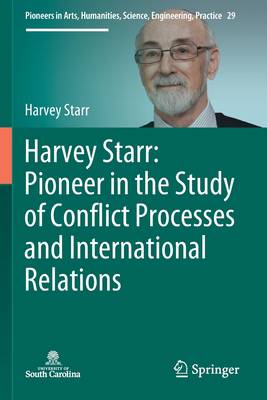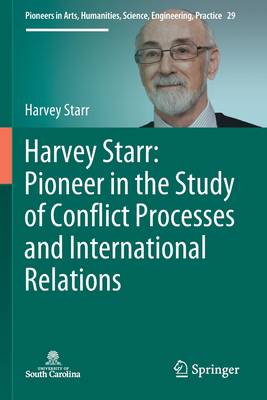
- Retrait gratuit dans votre magasin Club
- 7.000.000 titres dans notre catalogue
- Payer en toute sécurité
- Toujours un magasin près de chez vous
- Retrait gratuit dans votre magasin Club
- 7.000.0000 titres dans notre catalogue
- Payer en toute sécurité
- Toujours un magasin près de chez vous
Harvey Starr: Pioneer in the Study of Conflict Processes and International Relations
Harvey Starr
126,95 €
+ 253 points
Format
Description
This book sets out, through Starr's personal story, his interest in how the ideas of "intellectual trajectories" and "political memories" could be incorporated into intellectual autobiography, thus exploring how the personal lives of individual academics intersected with their professional interests. By following the development of his approach to research, interdisciplinarity, the logic of inquiry, and the opportunity and willingness framework scholars and researchers will see how his groundbreaking research in Conflict Processes and International Relations Theory developed and were interlinked (especially diffusion, geography and spatiality; the democratic peace and integration; decision making). In addition, graduate students and junior faculty should find useful hints about how to navigate their way through the complexities of becoming both a professional and successful academic and scholar.
- This book provides the most complete treatment of the workand contributions of Harvey Starr, a former President of the International Studies Association.
- Important for contemporary students of international relations, and their understanding of IR theory and methods.
- Demonstrates an eclectic linking of theoretical, logical, and empirical approaches to the study of IR--providing a critical logic of inquiry to do research.
- Provides insights and blueprints for how to develop interdisciplinary and multidisciplinary scholarship, highlighting geography and social-psychology.
- Affords graduate students and recent Ph.D.s guidance in the development of research, becoming a professional, and the choices to be made in one's academic career.
- This book provides the most complete treatment of the workand contributions of Harvey Starr, a former President of the International Studies Association.
- Important for contemporary students of international relations, and their understanding of IR theory and methods.
- Demonstrates an eclectic linking of theoretical, logical, and empirical approaches to the study of IR--providing a critical logic of inquiry to do research.
- Provides insights and blueprints for how to develop interdisciplinary and multidisciplinary scholarship, highlighting geography and social-psychology.
- Affords graduate students and recent Ph.D.s guidance in the development of research, becoming a professional, and the choices to be made in one's academic career.
Spécifications
Parties prenantes
- Auteur(s) :
- Editeur:
Contenu
- Nombre de pages :
- 230
- Langue:
- Anglais
- Collection :
- Tome:
- n° 29
Caractéristiques
- EAN:
- 9783030789091
- Date de parution :
- 13-09-22
- Format:
- Livre broché
- Format numérique:
- Trade paperback (VS)
- Dimensions :
- 156 mm x 234 mm
- Poids :
- 353 g

Les avis
Nous publions uniquement les avis qui respectent les conditions requises. Consultez nos conditions pour les avis.






